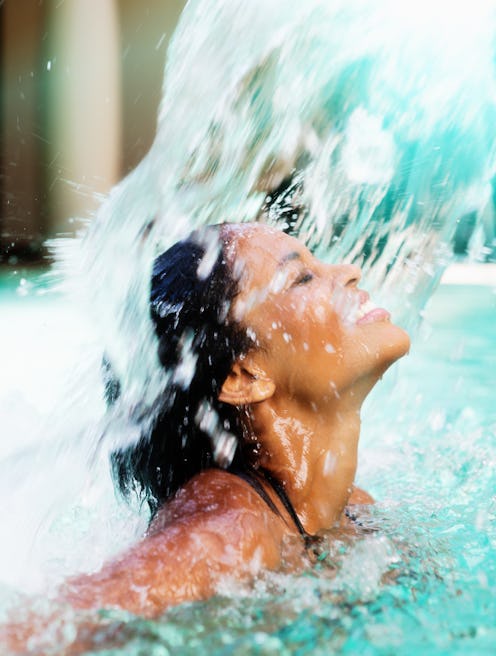Self
One Extremely Quick Trick To Make Yourself Feel Better
Don’t forget to reapply your makeup after.

It’s a classic move and TV trope: The protagonist, fresh off a fight or some bad news, splashes their face with cold water to calm down. Therapists tell Bustle that, while it may seem weird, the water-splashing technique is a reliable trick when you need to make yourself feel better, stat. It’s called the mammalian diving response, and even if you’re miles from a pool or the ocean, you can replicate it with your average bathroom sink. No need to go all Leo in Inception and plunge fully clothed into a bathtub, though.
“Submerging your face in cold water is a technique for managing intense emotional arousal,” Liz Kelly LICSW, a therapist with mental health platform Talkspace, tells Bustle. It’s why dipping your head under the waves at the beach makes everything feel a bit letter: the diving reflex triggers a host of soothing responses throughout the body, quieting the nervous system. She says it’s often used in dialectical behavior therapy, a kind of talking therapy used to help people calm really intense emotions. If you’re looking for ways to make yourself feel better and can’t book a spa weekend in Napa right now, this could be your ticket to feeling more chilled-out.
Why Putting Your Face In Cold Water Makes You Feel Better
Kelly explains that the diving reflex is the body’s physiological response to submersion in cold water. “When people experience the diving reflex, their parasympathetic nervous system, the body’s ‘rest and digest’ mode, is triggered,” she says. “Your heart rate slows and you feel calmer.” It’s the body’s attempt to make sure you survive being underwater by conserving oxygen and slowing your heartbeat. It also makes the vessels on your skin constrict, driving blood to your internal organs. Once your nervous system slows, Kelly says, you’re no longer in “fight or flight” mode, and can look at your situation from a more relaxed perspective. It’s a good way to calm yourself down in a pinch.
Submerging your face in cold water also works because of the shock of the temperature change, therapist Meaghan Rice PsyD LPC, also a Talkspace practitioner, tells Bustle. “This is one of my most favorite tactics to reroute away from the rabbit hole,” she says. It’s part of a spectrum of therapy techniques known as TIPP — temperature, intense exercise, paced breathing, and progressive muscle relaxation — that can help people in moments of intense distress or emotion.
If you’re wondering the right temp to make yourself feel better, the colder the water, the better, Rice explains. “When we focus on the temperature change — the heat morphing into ice cold — it reels us into the present moment,” she says. Like a lot of mindfulness techniques, the diving reflex anchors you into the here and now by giving your body a little harmless shock.
The effect may seem subtle, but it’s used to help people in life-threatening situations. A 2017 study published in American journal of physiology on people who’d lost a lot of blood found triggering the mammalian diving reflex helped raise the patients’ blood pressure, as the body sent blood racing to the heart, thinking it was underwater.
The Best Way To Calm Yourself Down With Cold Water
“To make the diving reflex work for you, fill a bowl or sink with icy cold water,” Kelly says. “Take a deep breath in, hold your breath, and submerse your entire face in the cold water until your eyes and cheekbones are submerged.” Once you feel your heart rate go down, pull back out. She recommends that if you have any health concerns or heart problems, you check with your doctor before trying it.
The experience can also be a bit uncomfortable, so don’t push yourself too hard. “There’s no doubt it woke me up (that's for sure!),” Melodi Erdogan wrote for Bustle after trying it out to refresh her skin and close her pores. “But I wouldn't recommend it for everyday.” It may help you feel better in short doses, or in response to stressful emotions, not as part of your morning routine.
Still not quieting your mind? Rice suggests consciously trying to let go of ruminations, worries, and stressful thoughts. “The past has come and gone, the future is yet to come. So the only thing we can really successfully maneuver is the here and now,” she says. “Splash that cold water on your face and bring yourself right in!”
Experts:
Liz Kelly LICSW
Meaghan Rice PsyD LPC
Studies cited:
Johnson, B. D., Sackett, J. R., Sarker, S., & Schlader, Z. J. (2017). Face cooling increases blood pressure during central hypovolemia. American journal of physiology. Regulatory, integrative and comparative physiology, 313(5), R594–R600. https://doi.org/10.1152/ajpregu.00253.2017
Panneton, W. M., & Gan, Q. (2020). The Mammalian Diving Response: Inroads to Its Neural Control. Frontiers in neuroscience, 14, 524. https://doi.org/10.3389/fnins.2020.00524